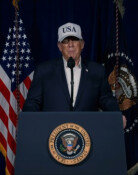Medical school admissions quota increase
Medical school admissions quota increase
Posted February. 07, 2024 07:34,
Updated February. 07, 2024 07:34
The medical school admissions quota is set to experience a substantial increase, rising by 2,000 slots to reach a total of 5,058 starting from the 2025 college admissions cycle. This marks the first adjustment in 31 years since 1994.
The government held the Healthcare and Medical Policy Deliberation Committee meeting on Tuesday, during which a bill to raise the quota for medical school admissions was approved. Minister Cho Gyu-hong, in a subsequent press briefing, highlighted the anticipated surge in demand for healthcare services due to the rapidly aging population. Citing a projected shortage of 15,000 doctors by 2035 based on supply and demand assessments, the government opted to elevate the medical school enrollment quota.
It takes at least six years for a first-year medical school student to graduate from college and become a practicing general doctor. The government has outlined a plan to sustain the increased medical school admissions quota by 2,000 slots from 2024 onwards for the next five years. This strategy aims to ensure that an additional 10,000 doctors will be available from 2031 to 2035. The remaining shortage of 5,000 physicians will be addressed by recruiting retirees.
Recognizing the more acute shortage of physicians in rural areas compared to Seoul metropolitan areas, the government plans to allocate an augmented quota predominantly to regional medical schools. Minister Cho also revealed intentions to elevate the proportion of students applying to medical schools in non-metropolitan areas from the current 40 percent to 60 percent. The Ministry of Education will determine specific quotas for each university by April. However, the feasibility of establishing new medical schools in the coming year will be under government scrutiny.
The proposed increase in the quota has met strong opposition from the medical community, resulting in a nationwide strike announcement by doctors. Lee Pil-soo, head of the Korean Medical Association, expressed dissent at a press conference, revealing plans for the entire leadership to step down and stage a protest after the Korean New Year holiday. A majority of interns and residents working in large hospitals, as indicated by a survey, are poised to participate in the strike, with 88.2 percent of 10,000 respondents expressing their intent to join.
In response to the potential illegal strike, Minister Cho asserted a firm stance in accordance with the Medical Act. The Ministry of Health and Welfare elevated the healthcare crisis warning stage from “attention” to “caution” due to the looming risk of a widespread strike. The government remains committed to addressing the critical shortage of healthcare professionals while navigating the challenges posed by the medical community’s resistance to the proposed changes.
Sung-Min Park min@donga.com




![[단독]폴란드, 韓 해군 최초 잠수함 ‘장보고함’ 무상 양도 안받기로](https://dimg.donga.com/c/138/175/90/1/wps/NEWS/IMAGE/2026/02/27/133437397.1.jpg)


